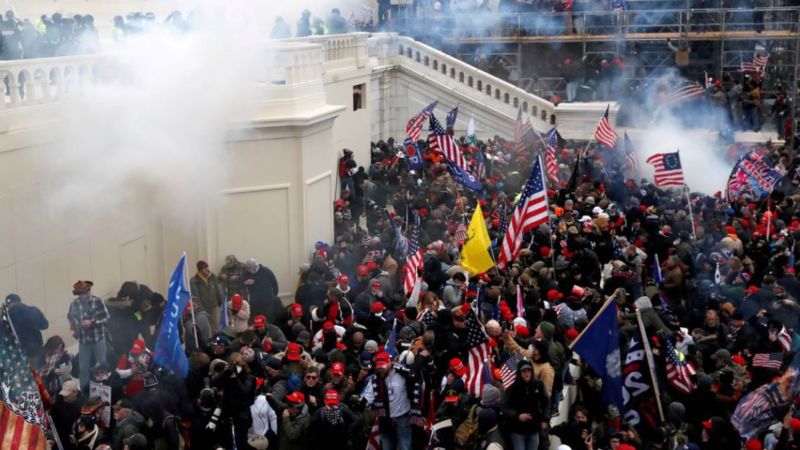Banks and other financial institutions in the US are scrambling to address the threats posed by a renewed government focus on domestic terrorism
As the U.S. Treasury Department works to align its anti-money laundering (AML) regulations with updated national AML priorities, financial institutions are scrambling to address risks posed by a fresh Treasury focus on domestic extremism and terrorism.
PayPal Holdings has taken the most public step yet to address this threat, announcing late last month that it is partnering with the Anti- Defamation League (ADL), a non- profit organization which works to fight anti-Semitism and hate crimes, to track financial activity linked to domestic extremism and terrorism.
“Domestic terrorism and extremism is not a new typology, but does require our collective focus to continue to educate ourselves in a dynamic risk area,” says David Szuchman, head of global financial crime at PayPal. “Multi-sector collaborations like our research initiative with the ADL and other civil rights organizations can provide an opportunity for all to learn, and they plan to share their findings broadly with the financial industry and with law enforcement to better understand and mitigate threats.”
On June 30, Treasury’s Financial Crimes Enforcement Network (FinCEN) issued a document outlining top U.S. financial crime priorities, as required by the AML Act of 2020. Treasury identified: corruption; cybercrime; foreign and domestic terrorist financing; fraud; transnational criminal organization activity; drug trafficking organization activity; human trafficking and human smuggling; and proliferation financing.
By year’s end, FinCEN must issue amended Bank Secrecy Act (BSA) regulations clarifying how financial institutions must incorporate the priorities into their AML programs. New requirements around domestic terrorism are of particular concern to financial institutions.
While nearly all of the priorities named by FinCEN reflected activity long-addressed by financial institutions, some seem to have been caught a bit flat-footed by the inclusion of domestic terrorism, panelists said during a recent online AML conference held by the Association of Certified Financial Crime Specialists (ACFCS).
“The one that… is really new is domestic terrorist financing,” said Ross Delston, a St. Louis, Missouri-based AML attorney and expert witness. “At least for a few years before another political party takes office, I could see that as jogging financial institutions into doing more, although it’s very difficult to do without a list of names of organizations and people — that has an aura of newness.”
PayPal — and perhaps other financial institutions — began more closely tracking the risks associated with domestic terrorism and extremism in 2017 after white supremacist protests over plans to remove a statue of Confederate General Robert E. Lee led to clashes in which a woman was run down by a car and killed in Charlottesville, Va.
This year, conversations spiked throughout the U.S. among AML professionals after thousands of then-President Donald Trump supporters stormed the U.S. Capitol on January 6 in an unsuccessful attempt to stop Congress from certifying Democratic President Joe Biden’s election win. More than 535 people have been charged thus far with taking part in the violence. And on July 23, two Ohio men — Derek Jancart, 39, and Erik Rau, 28 — pleaded guilty to disorderly conduct charges and face up to six months in prison when sentenced for their roles in the attack. They were at least the 20th and 21st persons to plead guilty to criminal charges.
Lack of domestic terrorism blacklist problematic for banks
The challenge for financial institutions is that it can be difficult to distinguish free speech and activism from extremism and potential domestic terrorism without clear guidance — and even blacklisting — by government authorities. There is no indication the U.S. government plans to create a domestic terrorism list to parallel the list of foreign terrorists maintained by Treasury’s Office of Foreign Assets Control (OFAC).
Efforts to combat foreign terror finance “have been really focused on lists of foreign terrorist organizations, lists of foreign terrorists,” explained Jim Richards, a former BSA officer at Wells Fargo who now runs RegTech Consulting, during the ACFCS panel. “And I don’t know of anybody who’s going to be able to put together a list of domestic terrorists. Is it the Anti-Defamation League? Is it the Southern Poverty Law Center? I think it’s a slippery political slope and it’s going to be very difficult to implement.”
PayPal’s partnership with ADL will probe how extremist and hate movements in the United States take advantage of financial platforms to fund criminal activities. The initiative will be led through ADL’s Center on Extremism and will focus on uncovering and disrupting the flow of funds supporting white supremacist and anti-government organizations. It will also look at networks spreading and profiting from anti-Semitism, Islamophobia, racism, or anti-immigrant, anti-Black, anti-Hispanic , and anti-Asian bigotry.
The information collected through the initiatives will be shared with other firms in the financial industry, law enforcement, and policymakers, PayPal said.
High-stakes compliance
It is important that financial institutions find ways to demonstrate that they are taking the domestic terrorism threat seriously.
The U.S. Justice Department unit responsible for policing bank AML compliance will scrutinize financial institutions to ensure they adhere to soon-to-be-amended AML regulations implementing the new national AML priorities, a Justice official said during the ACFCS conference, adding that addressing domestic terrorism will one piece of the new AML compliance puzzle.
“The devil is going to be in the details,” noted Jennifer Ambuehl, chief of the Justice Department’s Bank Integrity Unit. “From my end, I want clear expectations for how these (priorities) should be incorporated into the BSA program because those (institutions), then, that genuinely want to comply with the law, can do it. And then those who genuinely don’t desire to comply with the law, that’s where we will be looking into willful violations and criminal prosecutions.”
Leaving aside discussions about whether certain groups should go on a domestic terrorism list or whether focus has changed with the shift in administrations, Ambuehl said that “a more high-level conversation is a really important one — and it’s the same one that I, as chief of the Bank Integrity Unit, am focused on. Treasury has told the industry what the governmental priorities are, and now we’ll all be watching to see how those priorities need to be incorporated into financial institutions’ risk-based (AML) programs. I would expect we’ll have rulemaking that explains to us what is required, how they should be incorporated.”







